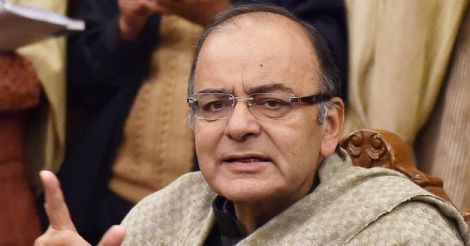The obsession of the Narendra Modi government to pass the Goods and Services Tax (GST) was again evident when the prime minister sent Parliamentary Affairs Minister Venkaiah Naidu to meet Congress president Sonia Gandhi. Such is the desperation that the government has proposed that the budget session of Parliament, normally starting after mid February, can begin a week in advance so that the crucial constitutional amendment is passed by Rajya Sabha where the government is in a minority.
Naidu and Finance Minister Arun Jaitley had made similar proposals both for the monsoon and winter sessions last year but the Congress had rebuffed their overtures. Now again the government wants the new national taxation law which would levy a uniform 16 per cent tax on most of the goods produced and services provided across the country.
The NDA government's economic philosophy seems to be that investments will pour in only if GST is enacted from April this year. Modi and his ministers have made this promise to big investors in both India and abroad that the GST will be the main feature of the economic reforms.
But there are skeptics within and outside the government who feel that economic activity, which is rather sluggish, will not pick up even if GST is passed. However, no one within the government is openly telling it that it should wait for GST to evolve at its own natural speed, rather than being hustled through Parliament. In fact, it is also worried that implementation of GST will actually push up the tax rates and thereby affect money circulation. When Modi came to power, service tax was at 12 per cent on majority of the services. Jaitley in his first budget pushed up the service tax to 14 per cent, thereby making most services, including food in air conditioned restaurants, phone and electricity bills costlier. Then he added another half per cent as cess for Swachch Bharat (Clean India) campaign. If GST comes, then service tax will go up by another one-and-a-half per cent. This would definitely increase the tax collection of both central and state governments, helping them to pay higher salary and allowances to government employees as recommended by the Pay Commission.
However, it is doubted that whether this increased tax income for the government will actually result in more spending and generation of demand for manufactured goods and services. Jaitley had kept the government expenditure on a tight leash during the last 18 months as he had to implement the finance commission's recommendations which gave higher share of central taxes to state governments, and also curb circulation of black money as promised during campaigning by Narendra Modi. Both Jaitley and Reserve Bank Governor Raghuram Rajan also tightened the screws on both public and private sector banks to speed up recovery of bad loans through strict measures including takeover of management of big defaulting companies.
While these steps contributed to better discipline, they did not help increase demand in the economy which would have generated more profits and jobs. In 2015, exports from India also took a hit, affecting job intensive sectors like garments and mining. A poor monsoon also put more pressure on the government as prices of food items like pulses have remained very high, causing voter anger in Bihar towards BJP.
Jaitley has begun his budget consultations, starting appropriately with the agriculture sector representatives. The finance minister will have to think hard on whether he should chase the difficult target of GST from April 1 or go for huge tax breaks and big government expenditure in his budget to boost the economy, as was done by Manmohan Singh in 1991, P. Chidambaram in 1996-97, Yashwant Sinha in 2000 and Chidambaram again in 2004. All these budgets had been described as dream budgets at that time, but had not been good for fiscal discipline of the government. As the government will soon enter the third year, this will be a critical budget in many ways.

























 Finance Minister Arun Jaitley (file photo)
Finance Minister Arun Jaitley (file photo)
Disclaimer
The comments posted here/below/in the given space are not on behalf of Manorama. The person posting the comment will be in sole ownership of its responsibility. According to the central government's IT rules, obscene or offensive statement made against a person, religion, community or nation is a punishable offense, and legal action would be taken against people who indulge in such activities.